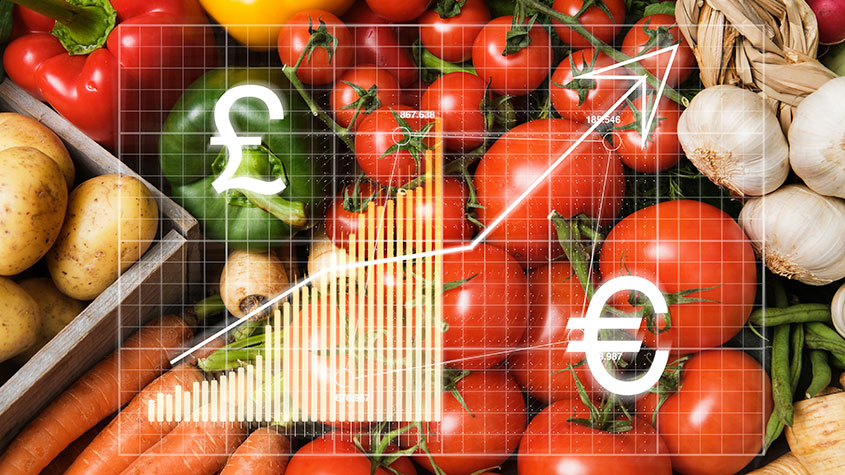How to profit from rising food prices: which stocks should you invest in?
Food prices are rising – we look at the stocks to avoid and the one to invest in this sector.


Get the latest financial news, insights and expert analysis from our award-winning MoneyWeek team, to help you understand what really matters when it comes to your finances.
You are now subscribed
Your newsletter sign-up was successful
Want to add more newsletters?

Twice daily
MoneyWeek
Get the latest financial news, insights and expert analysis from our award-winning MoneyWeek team, to help you understand what really matters when it comes to your finances.

Four times a week
Look After My Bills
Sign up to our free money-saving newsletter, filled with the latest news and expert advice to help you find the best tips and deals for managing your bills. Start saving today!
UK food-price inflation accelerated to 16.4% in October – up from 14.6% the previous month – according to the Office for National Statistics, adding further pressure to household budgets.
But while people will cut back on discretionary spending as we enter a recession, they are not going to stop buying food. For investors, this could be an opportunity to profit from higher food prices. We look at the stocks you should invest in and the ones you may want to avoid.
Stocks to avoid
Tesco (LSE: TSCO) and Sainsbury’s (LSE: SBRY) have both seen their share price slip by almost a quarter this year.
MoneyWeek
Subscribe to MoneyWeek today and get your first six magazine issues absolutely FREE

Sign up to Money Morning
Don't miss the latest investment and personal finances news, market analysis, plus money-saving tips with our free twice-daily newsletter
Don't miss the latest investment and personal finances news, market analysis, plus money-saving tips with our free twice-daily newsletter
That’s because both supermarkets talk about investing hundreds of millions of pounds to keep prices lower than competitors. The lag from passing on higher food prices has meant that sales have not kept pace with inflation and margins have been hit.
Despite having a roughly one-third market-share of the UK market, Tesco has delivered an average return on capital employed of 8.5%. Over the same time period, the same measure of profitability for Sainsbury’s is even lower – 4.3%.
Share-price performance has been underwhelming and both companies trade on a prospective price/earnings (p/e) ratio of around ten. In order to secure a re-rating from the low p/e multiples, the supermarkets need to use their high market shares to pass on costs to households and start generating higher returns.
But that’s not happening at present. Competition looks as strong as ever, while trying to raise prices ahead of inflation may result in unwanted media and political attention.
Food companies have not fared much better. Shares in US-listed Beyond Meat (Nasdaq: BYND), the vegan burger and sausage company, have fallen by 76% so far this year. Similarly Oatly (Nasdaq: OTLY), the plant-based milk company is down by 73% this year.
The larger, more established food brands do appear to have some pricing power. Earlier this year Tesco picked a fight with Kraft Heinz (Nasdaq: KHC), whose market value is $46bn; it has an earnings before interest and taxes (Ebit) operating margin above 20%. When Heinz increased the price of a tin of beans and ketchup, Tesco claimed that the price rises were unjustifiable. In July this year the supermarket reversed course and agreed to Heinz’s price rises.
Kellogg’s (NYSE: K), the breakfast cereal company ($24bn market cap) has similar market power, with a ROCE of 16% and an Ebit margin of 15%.
During the pandemic both companies raised revenue guidance as consumers sought comfort in processed foods. Indeed, the risk to the likes of Kraft Heinz and Kellogg’s may come from another direction: their marketing of processed foods high in sugar but positioned as healthy.
Meanwhile, the likes of Britvic (LSE: BVIC) and IrnBru maker AG Barr (LSE: BAG) were negatively impacted by the “sugar tax” introduced in 2018 by the government.
One stock to invest in to profit from rising food prices
That leaves investors with few palatable options, so I highlight London-listed Associated British Foods (LSE: ABF), which owns brands such as Kingsmill bread, Ryvita, and Patak’s.
ABF is more diversified than most food businesses (it also owns retailer Primark) and the investment case is built on an improvement in profitability. Earlier this month ABF reported that group revenue rose by 22% to £17bn and statutory profits before tax (PBT) gained 48% to £1.1bn in the year to mid-September 2022.
Within that, food sales are growing 10%, whereas Primark (just under half of sales) saw revenues climb by 43% as the prior year was affected by lockdowns.
Aside from Primark, ABF is split into four food divisions (grocery, sugar, agriculture and ingredients). Its largest food division, grocery, makes up 22% of revenue and 26% of adjusted group profits, and reports a return on capital of 29%.
There is also a “crop protection business” – presumably PR speak for pesticides – that has had a much stronger year. The ingredients business, which makes bakers’ yeast, as well as more sinister-sounding food additives, saw revenues rise 19% to £1.8bn and adjusted PBT up 3% to £159m.
The group’s profitability should continue to rebound as Primark operates without the disruption of further lockdowns. For the food divisions, rising input costs have put pressure on margins in the short term but management believes eventually it can pass on price increases, so we should see profitability stabilise and then recover later in 2023.
The shares are on a price/earnings (p/e) ratio of 13 for the year to September 2023, well below the three-year average p/e of 20. ROCE has been falling from a peak of 15.5% achieved in 2017 to 7.3% last year. That resulted in the share price derating, but as profitability recovers that ought to drive a rerating.
Get the latest financial news, insights and expert analysis from our award-winning MoneyWeek team, to help you understand what really matters when it comes to your finances.

Bruce is a self-invested, low-frequency, buy-and-hold investor focused on quality. A former equity analyst, specialising in UK banks, Bruce now writes for MoneyWeek and Sharepad. He also does his own investing, and enjoy beach volleyball in my spare time. Bruce co-hosts the Investors' Roundtable Podcast with Roland Head, Mark Simpson and Maynard Paton.
-
 ISA fund and trust picks for every type of investor – which could work for you?
ISA fund and trust picks for every type of investor – which could work for you?Whether you’re an ISA investor seeking reliable returns, looking to add a bit more risk to your portfolio or are new to investing, MoneyWeek asked the experts for funds and investment trusts you could consider in 2026
-
 The most popular fund sectors of 2025 as investor outflows continue
The most popular fund sectors of 2025 as investor outflows continueIt was another difficult year for fund inflows but there are signs that investors are returning to the financial markets
-
 Halifax: House price slump continues as prices slide for the sixth consecutive month
Halifax: House price slump continues as prices slide for the sixth consecutive monthUK house prices fell again in September as buyers returned, but the slowdown was not as fast as anticipated, latest Halifax data shows. Where are house prices falling the most?
-
 Rents hit a record high - but is the opportunity for buy-to-let investors still strong?
Rents hit a record high - but is the opportunity for buy-to-let investors still strong?UK rent prices have hit a record high with the average hitting over £1,200 a month says Rightmove. Are there still opportunities in buy-to-let?
-
 Pension savers turn to gold investments
Pension savers turn to gold investmentsInvestors are racing to buy gold to protect their pensions from a stock market correction and high inflation, experts say
-
 Where to find the best returns from student accommodation
Where to find the best returns from student accommodationStudent accommodation can be a lucrative investment if you know where to look.
-
 The world’s best bargain stocks
The world’s best bargain stocksSearching for bargain stocks with Alec Cutler of the Orbis Global Balanced Fund, who tells Andrew Van Sickle which sectors are being overlooked.
-
 Revealed: the cheapest cities to own a home in Britain
Revealed: the cheapest cities to own a home in BritainNew research reveals the cheapest cities to own a home, taking account of mortgage payments, utility bills and council tax
-
 UK recession: How to protect your portfolio
UK recession: How to protect your portfolioAs the UK recession is confirmed, we look at ways to protect your wealth.
-
 Buy-to-let returns fall 59% amid higher mortgage rates
Buy-to-let returns fall 59% amid higher mortgage ratesBuy-to-let returns are slumping as the cost of borrowing spirals.